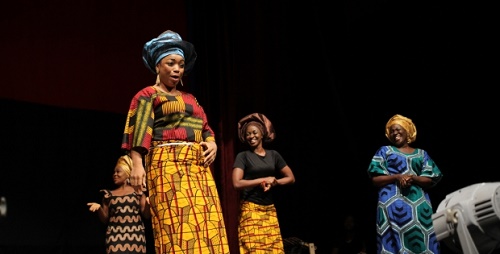
There isn’t a lot of set design, no special effects. You won’t walk out of the theater singing the catchy title tune and you probably won’t be quoting the catch phrases around the water cooler the day after the show.
You will, however, after watching a performance of HEAR WORD! Naija Woman Talk True, leave the Harvard Dance Center a changed person, and changed for the better.
“The play was written to tell the story of women in Nigeria to the women in Nigeria. There was no indication anybody else would want to hear them,” director Ifeoma Fafunwa said in an interview with Color Magazine. “It wasn’t written for the world, but it turns out the world was waiting to hear these stories, too. And not just the women, either. Men now make up a large part of the audiences we perform to, whether they have been brought to the theater by their wives or girlfriends or come with their sons to share the message they are taking from the tales. It’s thrilling.”
HEAR WORD! Naija Woman Talk True, which will be making its U.S. premiere in Cambridge, combines artistry, social commentary, and true-life stories of inequality and transformation, delivered by a cast of ten women from Nigeria including Nigeria’s most popular film stars Joke Silva, Taiwo Ajai-Lycett and Bimbo Akintola. The stories, collected through a series of interviews with Nigerian women, examine what factors limit their potential for independence, leadership, and meaningful contribution. The play also examines the cultural and societal norms that oppress and limit African women with an aim towards empowering women to break the culture of silence, unite, challenge the status quo, move beyond barriers and create solutions.
“The first half of the show, I think, is the harder part for audiences,” Fafunwa said. “The stories are very intense, exploring the cultural and societal situations that women deal with, like the way they are treated by men, or by family members, that treat them like second class citizens, at best, or the more violent, traditions, like genital mutilation, that treat them as less than human. By sharing their stories, these women bring these terrible things out in the open for the audience to really look at and be confronted with, which was a radical idea when the play was first performed in Africa. Women all know these things happen, but they never talk about it publically. It was liberating for them to hear the stories and know they weren’t alone.”
Although some of the stories are tough to sit through, Fafunwa made it clear that the play wasn’t just a litany of horror stories the actresses rubbed in the audience’s face. The way they stories are told – with anger, warmth and even humor – make them enthralling to listen to. “Nigerian women are the New Yorkers of Africa,” Fafunwa said with a laugh. “They have a great attitude.”
The stories of the second half of the show, the director continued, is delivered in a more uplifting way, but with an underlying message that some in the audience may have a hard time taking in, at least when they first hear it. “It’s time for women to unite and to break the trends and traditions that have them tied down, and the first step they need to take is admitting that they are responsible for their own lives, and that is a universal message. A Nigerian woman who marries a man to become his third or fourth wife devalues herself and says I’m not worth a man by myself. When American watch a show like Flavor of Love to see women fighting each other over the chance to date a rap star, you have to remember that nobody made them go on TV; they chose to do that to themselves and the degradation they go through is their own fault.
“And let’s not forget,” she added, “that although men are given the blame for genital mutilation, it is a woman who performs the operation.
“It’s easy to say men are the enemy,” she added. “The real struggle is to admit that you are allowing him to have power over you and to make that stand to not let it happen anymore.”
HEAR WORD! Naija Woman Talk True directed by Ifeoma Fafunwa will make its U.S. premiere April 15–17 at the Harvard Dance Center.
Performance dates:
April 15 @ 7:30PM
April 16 @ 2PM – includes a post-performance discussion with the director and cast
April 16 @ 7:30PM
April 17 @ 2PM – includes a post-performance panel discussion with experts from Harvard University
Performances will be at the Harvard Dance Center, 60 Garden Street, Cambridge, MA.
A.R.T. of Human Rights will present a discussion with Ifeoma Fafunwa and Timothy P. McCarthy, Adjunct Lecturer on Public Policy, Program Director of the Carr Center for Human Rights Policy on Monday April 11 @ 7:30PM, Tsai Auditorium, 1730 Cambridge Street, Cambridge, MA.
Tickets from $25 are now on sale by phone at 617.547.8300, in person at the Loeb Drama Center, 64 Brattle Street, or online at americanrepertorytheater.org.


